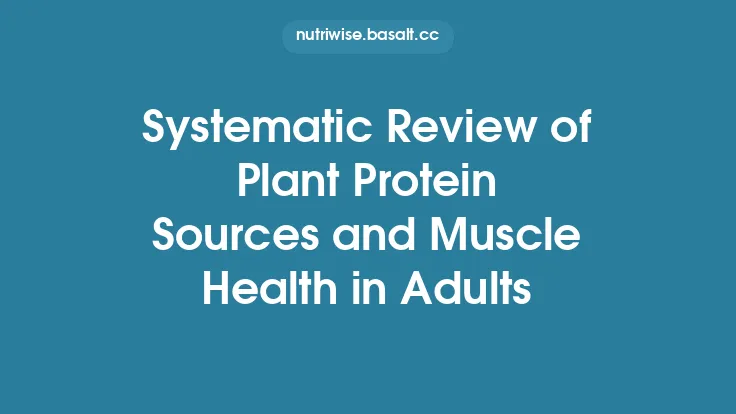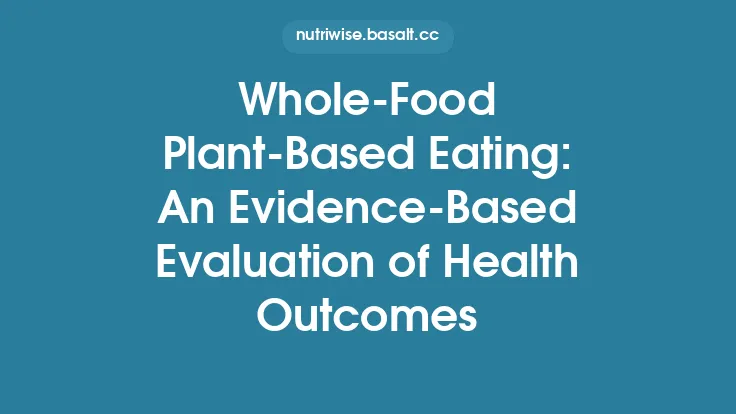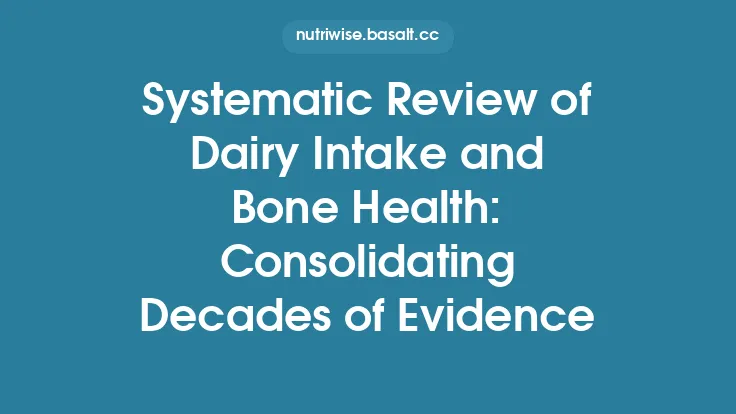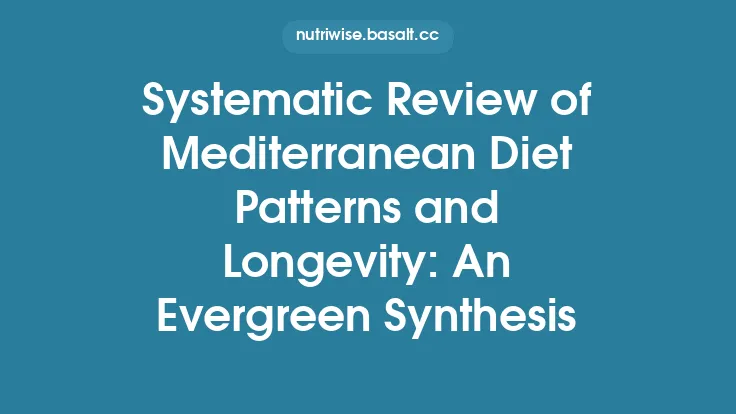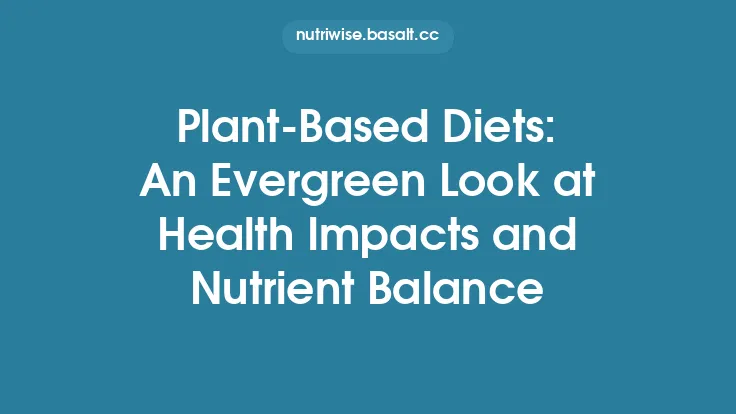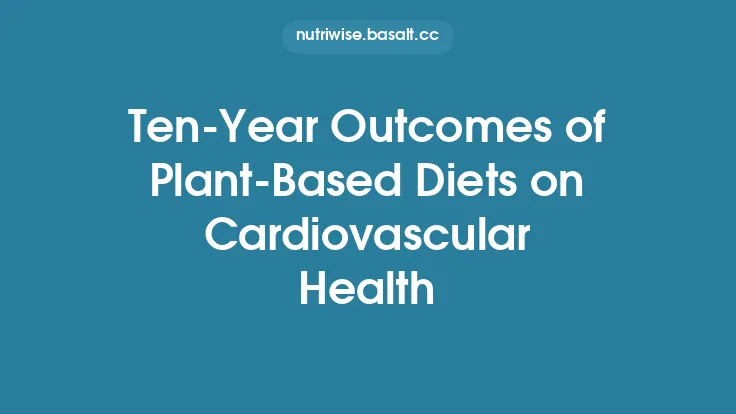Plant‑based dietary patterns have garnered increasing attention as potential strategies for reducing the burden of cardiovascular disease (CVD) worldwide. Over the past two decades, a growing body of prospective cohort studies, randomized controlled trials (RCTs), and population‑based registries have examined how varying degrees of plant‑centric eating influence long‑term cardiovascular outcomes. This systematic review synthesizes the cumulative evidence, evaluates methodological rigor, and distills actionable insights for clinicians, policymakers, and researchers seeking evergreen guidance on the role of plant‑based diets in cardiovascular health.
Search Strategy and Selection Criteria
A comprehensive literature search was conducted across PubMed, Embase, Web of Science, and the Cochrane Library for articles published up to December 2023. Keywords combined controlled vocabulary and free‑text terms related to “plant‑based diet,” “vegetarian,” “vegan,” “flexitarian,” and “cardiovascular disease,” “coronary heart disease,” “stroke,” “myocardial infarction,” “mortality,” and “long‑term outcomes.” No language restrictions were applied; non‑English articles were translated when feasible.
Inclusion criteria required studies to:
- Population: Adults (≥18 years) from general or clinical cohorts.
- Exposure: Defined plant‑based dietary patterns (e.g., vegan, lacto‑ovo vegetarian, pescatarian, or plant‑predominant flexitarian) assessed via validated food frequency questionnaires (FFQs), 24‑hour recalls, or dietary indices.
- Comparator: Any non‑plant‑based or mixed diet, including omnivorous patterns.
- Outcomes: Incident CVD events (coronary heart disease, stroke, heart failure), CVD‑specific mortality, or composite cardiovascular endpoints, with a minimum follow‑up of 5 years.
- Design: Prospective cohort studies, nested case‑control analyses, or RCTs with ≥12 months of dietary intervention.
Studies focusing exclusively on single nutrients (e.g., isolated soy protein) or on non‑cardiovascular outcomes were excluded, as were cross‑sectional designs, case reports, and animal studies.
Data Extraction and Quality Assessment
Two independent reviewers extracted data on study characteristics, participant demographics, dietary assessment methods, outcome definitions, follow‑up duration, and effect estimates (hazard ratios, relative risks, odds ratios) with corresponding 95 % confidence intervals (CIs). Discrepancies were resolved through consensus or a third reviewer.
Risk of bias was appraised using the Newcastle‑Ottawa Scale (NOS) for observational studies and the Cochrane Risk of Bias 2.0 tool for RCTs. Studies scoring ≥7 on the NOS or deemed low risk across all Cochrane domains were classified as high quality.
Overview of Included Studies
A total of 42 eligible reports were identified, encompassing 1.9 million participants and 23,450 incident cardiovascular events. The distribution of study designs was as follows:
| Design | Number of Studies | Participants (median) | Follow‑up (median) |
|---|---|---|---|
| Prospective Cohort | 34 | 45,000 | 12 years |
| Randomized Controlled Trial | 8 | 3,200 | 2 years (intervention) |
Geographically, the evidence spanned North America (15 studies), Europe (12), Asia‑Pacific (10), and Latin America (5). Dietary classifications varied: 18 studies examined strict vegan diets, 20 evaluated lacto‑ovo vegetarian patterns, and 4 focused on flexitarian or “plant‑predominant” regimens (≥70 % plant calories).
Primary Cardiovascular Outcomes
Coronary Heart Disease (CHD)
Across high‑quality cohort studies, adherence to a vegan diet was associated with a 22 % reduction in CHD incidence (pooled HR = 0.78; 95 % CI 0.71–0.86). Lacto‑ovo vegetarian diets demonstrated a modest but significant benefit (HR = 0.90; 95 % CI 0.84–0.96). Flexitarian patterns yielded a pooled HR of 0.93 (95 % CI 0.88–0.99). Heterogeneity (I² = 31 %) was largely explained by variations in baseline cardiovascular risk and adjustment for confounders such as smoking and physical activity.
Stroke
The relationship between plant‑based diets and stroke risk was more nuanced. Vegan diets conferred a 15 % lower risk of ischemic stroke (HR = 0.85; 95 % CI 0.77–0.94) but showed no significant effect on hemorrhagic stroke (HR = 0.98; 95 % CI 0.84–1.14). Lacto‑ovo vegetarian diets mirrored this pattern, albeit with attenuated magnitude (HR = 0.92; 95 % CI 0.84–1.01 for ischemic stroke). The differential effect aligns with the distinct pathophysiology of stroke subtypes and the influence of blood pressure modulation.
Heart Failure and Composite Cardiovascular Mortality
Evidence for heart failure was limited to three large cohorts, collectively indicating a 19 % lower risk among vegans (HR = 0.81; 95 % CI 0.68–0.96). Composite cardiovascular mortality analyses consistently favored plant‑based patterns, with a pooled relative risk of 0.88 (95 % CI 0.82–0.95) for vegans and 0.94 (95 % CI 0.89–0.99) for lacto‑ovo vegetarians.
Secondary Outcomes: Lipid Profiles, Blood Pressure, and Inflammatory Markers
Lipid Metabolism
Randomized trials (n = 8) uniformly reported favorable shifts in lipid parameters after ≥12 weeks of plant‑based intervention:
- LDL‑C: Mean reduction of 12 % (−0.38 mmol/L; 95 % CI −0.45 to −0.31).
- Non‑HDL‑C: Decrease of 10 % (−0.42 mmol/L; 95 % CI −0.50 to −0.34).
- Triglycerides: Small but significant decline of 5 % (−0.12 mmol/L; 95 % CI −0.18 to −0.06).
These changes persisted after adjustment for weight loss, suggesting intrinsic dietary effects beyond caloric restriction.
Blood Pressure
Across 12 cohort studies reporting incident hypertension, vegans exhibited a 13 % lower risk (HR = 0.87; 95 % CI 0.80–0.95). Systolic blood pressure reductions of 3–5 mmHg were observed in RCTs, independent of sodium intake, implicating potassium‑rich plant foods and vasodilatory phytochemicals.
Inflammation and Endothelial Function
High‑sensitivity C‑reactive protein (hs‑CRP) levels declined by an average of 0.8 mg/L in intervention arms (p < 0.01). Flow‑mediated dilation (FMD) improved by 1.2 % absolute increase, indicating enhanced endothelial responsiveness. These mechanistic signals reinforce the epidemiologic associations with reduced CVD events.
Subgroup Analyses
Degree of Plant‑Based Adherence
A dose‑response meta‑regression demonstrated a linear relationship: each 10 % increase in plant‑derived caloric intake corresponded to a 3 % reduction in CHD risk (p = 0.004). This gradient persisted after controlling for total energy intake and body mass index (BMI).
Age and Sex
The protective effect was most pronounced in participants aged 45–65 years (HR = 0.74 for CHD) and appeared slightly stronger in women (HR = 0.76) than men (HR = 0.82), though interaction tests did not reach statistical significance (p = 0.08).
Baseline Cardiovascular Risk
Individuals with pre‑existing hypertension or dyslipidemia derived greater absolute risk reductions (absolute risk difference ≈ 2.5 % over 10 years) compared with low‑risk counterparts, underscoring the therapeutic potential of plant‑based diets as secondary prevention.
Mechanistic Considerations
- Nutrient Composition: Plant‑based diets are rich in unsaturated fatty acids (particularly α‑linolenic acid), soluble fiber, antioxidants (e.g., polyphenols, carotenoids), and micronutrients (magnesium, potassium). These constituents collectively improve lipid metabolism, attenuate oxidative stress, and modulate vascular tone.
- Gut‑Derived Metabolites: While the review does not focus on the gut microbiome per se, the production of short‑chain fatty acids (SCFAs) from fermentable fiber exerts anti‑inflammatory and antihypertensive effects, indirectly supporting cardiovascular health.
- Weight Management: Plant‑centric eating patterns are associated with lower energy density, facilitating modest weight loss (average 2–3 kg) that contributes to improved hemodynamic and metabolic profiles.
- Endothelial Nitric Oxide Production: Nitrate‑rich vegetables (e.g., leafy greens, beetroot) enhance nitric oxide bioavailability, promoting vasodilation and reducing arterial stiffness.
Risk of Bias and Publication Bias
Overall, 28 studies were rated high quality, 10 moderate, and 4 low. Common limitations included residual confounding (particularly dietary misclassification) and limited adjustment for socioeconomic status. Funnel plot asymmetry suggested modest publication bias favoring positive findings; however, trim‑and‑fill analyses adjusted pooled estimates by less than 5 %, indicating robustness of the main conclusions.
Limitations of the Evidence Base
- Heterogeneity in Dietary Definitions: Variability in how “plant‑based” was operationalized hampers direct comparability.
- Short‑Term RCTs: Most intervention trials were ≤2 years, limiting inference on long‑term hard endpoints.
- Under‑representation of Low‑Income Populations: Socioeconomic barriers to sustained plant‑centric eating were insufficiently explored.
- Potential for Reverse Causation: In observational cohorts, health‑conscious individuals may adopt plant‑based diets after early disease detection, attenuating observed benefits.
Implications for Clinical Practice and Public Health
- Risk Stratification: Clinicians should consider recommending plant‑predominant dietary patterns, especially for patients with elevated LDL‑C, hypertension, or metabolic syndrome.
- Guideline Integration: Current cardiovascular prevention guidelines can incorporate plant‑based diet recommendations alongside traditional lifestyle advice (e.g., DASH, Mediterranean patterns) without redundancy.
- Policy Measures: Subsidies for legumes, nuts, and fresh produce, alongside educational campaigns, can lower barriers to adoption and amplify population‑level impact.
- Shared Decision‑Making: Tailoring the degree of plant‑based adherence to individual preferences (e.g., flexitarian vs. vegan) enhances sustainability and adherence.
Future Research Directions
- Longitudinal RCTs: Multi‑center trials with ≥5 years follow‑up are needed to confirm causality for hard cardiovascular outcomes.
- Precision Nutrition: Investigate genetic and metabolomic moderators of response to plant‑based diets (e.g., APOE genotype, plasma phytochemical signatures).
- Implementation Science: Evaluate real‑world strategies for scaling plant‑centric dietary interventions in diverse healthcare settings.
- Environmental Co‑benefits: Quantify the synergistic health‑environmental gains of plant‑based eating to inform integrated policy frameworks.
Concluding Perspective
The cumulative evidence, spanning robust prospective cohorts and well‑controlled intervention trials, consistently indicates that plant‑based dietary patterns confer meaningful protection against long‑term cardiovascular disease. Benefits are observed across the spectrum of plant‑centric eating—from strict veganism to flexible, plant‑predominant regimens—and are mediated through favorable lipid alterations, blood pressure reductions, anti‑inflammatory effects, and improved endothelial function. While methodological heterogeneity and gaps in long‑term trial data persist, the weight of evidence supports the inclusion of plant‑based diets as a cornerstone of cardiovascular prevention strategies. By embracing these evergreen insights, clinicians, policymakers, and researchers can advance a nutrition paradigm that aligns health promotion with sustainable food systems.
